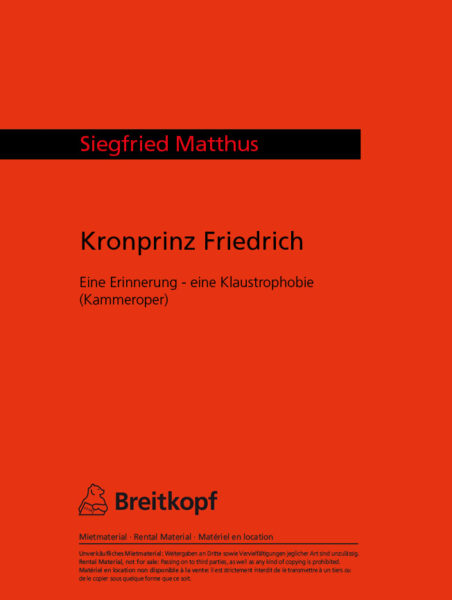Siegfried Matthus (1934–2021) Kronprinz Friedrich
Eine Erinnerung – eine Klaustrophobie (Kammeroper) 1999/2000 Dauer: 80' Text: Thomas Höft
Uraufführung der 1. Fassung: Rheinsberg, 1999
Uraufführung der 2. Fassung: Radebeul, 2000
Nachdem Sie die gewünschten Ausgaben in den Warenkorb gelegt haben, können Sie dort die benötigte Stückzahl bei Bedarf noch anpassen.
Personen: Friedrich (Mezzosopran) - Katte (Mezzosopran) - FRIEDRICH WILHELM; Vater (Bassbariton) - SOPHIE DOROTHEA, Mutter (Alt) - Wilhelmine, Friedrichs Schwester (Sopran) - Dorothea RITTER (Sopran) - Pfarrer (Bariton) - Richter (Bass) - Wachsoldat (Tenor) - 2 Totengräber (Tenor, Bass) - 4 Soldaten (Tenöre, Bariton, Bass)
Am 22. März 1996 waren Götz Friedrich und ich übereingekommen, zur Eröffnung des Rheinsberger Schlosstheaters gemeinsam eine Oper uraufzuführen. Welches Sujet sollte es sein? Nach Möglichkeit aus der Rheinsberger Historie. Prinz Heinrich? Nein. Zu dessen 100. Todesjahr 2002 wird man über künstlerische Projekte nachdenken. Also der junge Friedrich. Nun waren aber dessen Rheinsberger Jahre eine ungetrübte Zeit. Es sollte schon etwas dramatischeres sein - wir schauten uns an - und dann schoss es wie aus einem Munde: Katte! Götz Friedrich machte mich mit dem jungen Librettisten Thomas Höft bekannt. Die historisch genau belegten Fakten von der dramatischen Flucht und der Enthauptung Katten waren uns bekannt. Aber wie diese für ein Libretto gestalten? Die eine oder andere Möglichkeit wurde schnell verworfen. »Schreiben Sie mir einen zweiten Cornet« warf ich unbedacht in die Diskussion. Nach zwei Wochen und hatte ich einen wunderbaren Text in den Händen. Hochpoetisch, sensibel in den Andeutungen, neuartig in der szenischen Anlage, explosiv in den Konflikten, viel Raum für Musik. Friedrich und Katte sind als Hosenrollen komponiert. Ich habe mich nach langem Überlegen dafür entschieden, weil junge Mezzosopranistinnen die pubertäre Jugendlichkeit besser darstellen und singen können als junge Männer. Es gibt dafür große Vorbilder in der Opernliteratur. Die10 Sänger, außer Friedrich und Vater Friedrich Wilhelm, singen und spielen mehrere Rollen. Es gibt sehr viele Ensemblesätze in dieser Oper.
Friedrich und die Flöte. Da kommt man nicht dran vorbei. Als ich überlegte, in welcher Weise die Flöte in meiner Komposition eingesetzt werden sollte, lernte ich das Ensemble der 14 Berliner Flötisten kennen und schrieb ein Stück für sie. Ich konnte sie für die Uraufführung meiner Oper gewinnen. So bekam die Friedrich-Flöte noch 13 Gedankenstimmen! Das Instrumentarium der Oper besteht nun aus 14 Flöten, drei Posaunen, Schlagzeug (drei Spieler), Cembalo und Kontrabass.
Die Flucht Friedrichs und die Hinrichtung Kattes sind die äußeren Vorgänge - die qualvolle Auseinandersetzung zwischen Vater und Sohn aber der eigentliche Konflikt der Oper. Friedrich Wilhelm wollte aus dem verzärtelten, musenbetonten Kronprinzen einen harten preußischen König modellieren. Und der junge Friedrich rebellierte gegen den überstrengen, scheinbar uneinsichtigen Vater. Rolf Reuter las schon frühzeitig das Libretto. Immer wieder wies er uns darauf hin, aus dem Vater keinen cholerischen Bösewicht zu machen, sondern die Motivation seines überstrengen Handelns zu begreifen und zu verstehen. Für Vater und Sohn war diese Zeit die Hölle. Aus diesem Fegefeuer ist ein großer König hervorgegangen.
(Siegfried Matthus)









